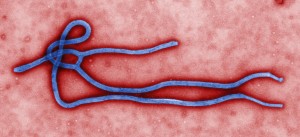Ebola Outbreak in U.S. Raises many Questions
October 7, 2014
The Federal Government of the Unites States has dropped the ball once again. On Sept. 30, the Centers for Disease Control announced that a critically ill person who traveled to and from Liberia is infected with the Ebola virus and is being treated at the Texas Health Presbyterian Hospital in Dallas.
What the government is not saying is why they did not restrict travel from the U.S. to West African countries that have been hit heavily by this disease in the first place. Considering the fact that there is no known cure for this virus and it kills 90 percent of the people who are infected by it, one would think travel restrictions and better screening would have been implemented long ago.

Ebola is an infectious disease that has killed about 3,000 people since the disease was first discovered in Zaire back in 1976. Of those deaths, 1,837 have occurred since March of this year. Yet the best the State Department could do was to warn travelers of the dangers of “non-essential” travel to Liberia?
The Ebola virus spreads via body fluids and it attacks blood-clotting cells that result in the infected person hemorrhaging to death. There are no known drugs or vaccines that are effective against Ebola.
Doctors treat people infected with Ebola with IV’s, oxygen, and medications to combat any infections the patient may develop while spending their time in strict isolation to prevent others from contracting the disease.
To help prevent people from bringing Ebola from Africa to the United States, Dr. Frieden of the CDC said the agency is working with airports around the world to isolate travelers with fevers to see if they are infected with Ebola.
However, what Dr. Frieden has not stated is how they can screen people with Ebola before they develop a fever. By the time someone develops a fever from an Ebola infection, the victim is able transmit the disease and is a threat to others.
The Texas patient infected with Ebola reportedly had no symptoms when flying back to the U.S. So how effective would a fever test have been in keeping this person or an asymptomatic infectious carrier from entering the United States?
President Barrack Obama, has recently pledged to send 3,000 U.S. troops to Ebola ridden West Africa. There they’ll help built treatment facilities, command posts, train health care workers and pass out home care kits to hundreds of thousands of households. This could generally increase the risk of troops being exposed and infected with Ebola which could be brought back to the U.S. via asymptomatic carriers. Such an event could cause an Ebola outbreak to occur in this country.
It is not clear as to how well trained or protected American personnel will be when they are over there. Nor is it clear as to how thoroughly they will be tested before returning to the U.S. to prevent an outbreak here.
It is clear however, that our government is putting its nose into something that we will regret in the long run. How many of our people will bring the disease back home? How far will the disease spread in the U.S.? Considering the fact that the Federal Government is in charge of the operation does not make a rational minded person feel any safer.





